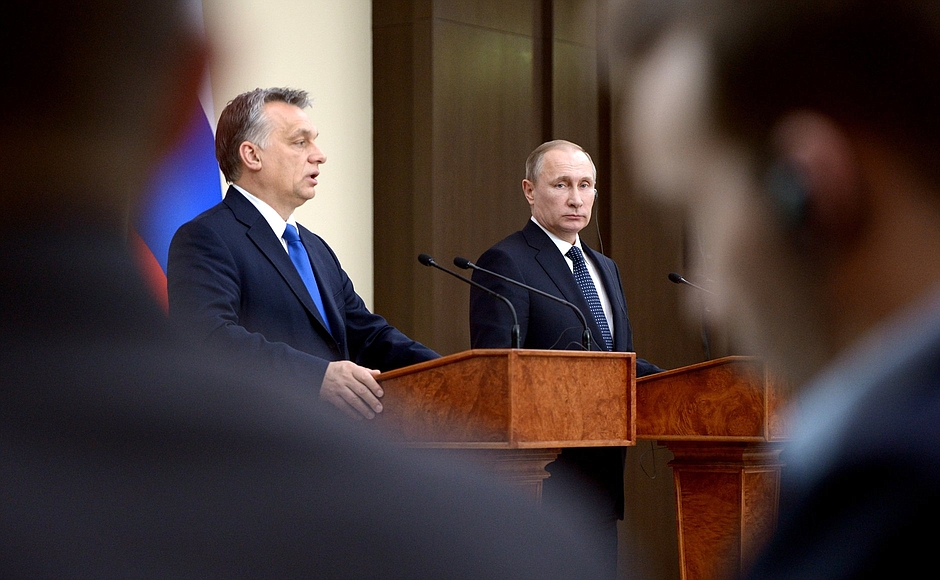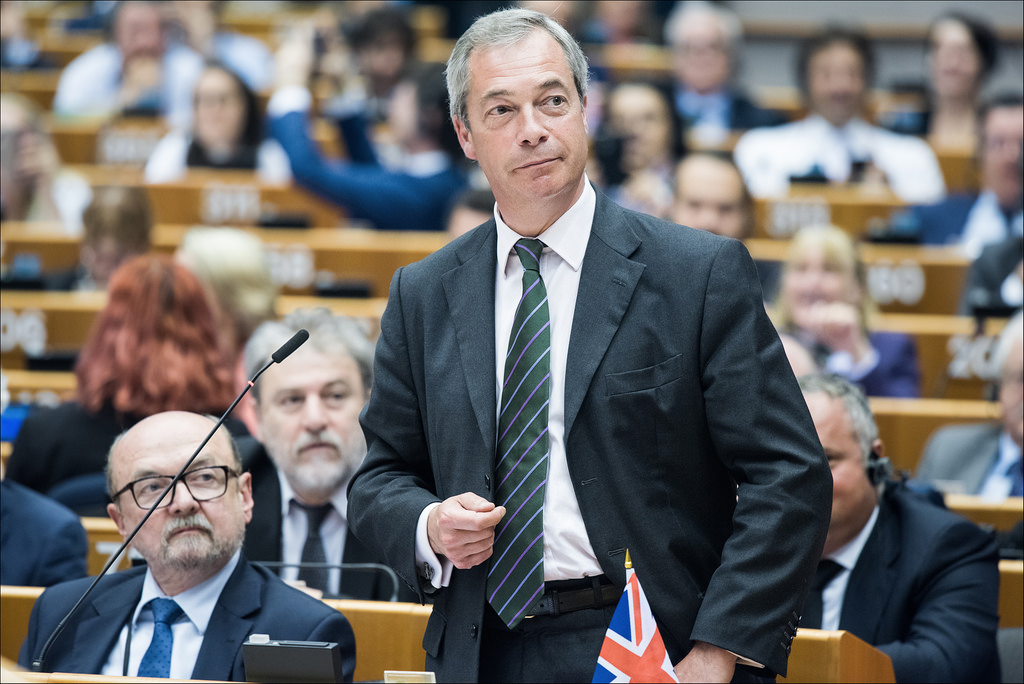For decades, the world has known a liberal and united Europe. But the Old Continent is in a deepening crisis–one with disturbing implications for democracies across the world.
Europe as we have known it for over five decades has been a stable and prosperous place at peace with itself, famous for its museums, cafes, classical architecture, and graceful retirement from history. But today, it’s under assault. The greatest refugee crisis since World War II is overwhelming the continent, while Jews flee by the thousands. Populist parties so outrageous that they make their American counterparts seem like milquetoast centrists are winning or almost winning one election after another. One of them—Viktor Orbán’s Fidesz—has already transformed Hungary into an authoritarian state. Russian President Vladimir Putin is swaggering like a conquering warlord and winning applause for his exploits as far west as Great Britain. The European Union has already begun to unravel and could be replaced down the road by God only knows what as an aloof United Kingdom decides to go it alone while Europe circles the drain.
Journalist and author James Kirchick lived and worked in Europe for six years, and in his bracing first book, The End of Europe: Dictators, Demagogues, and the Coming Dark Age, he dives deep into the continent’s turmoil. The cumulative effect is sobering and alarming, but also perversely comforting if misery truly loves company. The book makes it clear that America’s political crisis is part of a larger crisis of democratic liberalism and institutional legitimacy that stretches from Seattle to Athens, and Kirchick does his American readers an invaluable service by informing them, in a can’t-put-it-down style, that they aren’t going through this alone.
Connecting Europe’s seemingly disparate troubles is a continent-wide cratering of the political center and collapsing confidence in the liberal European idea. “In the wake of World War II,” Kirchick writes, “when Europe was divided, both the political left and right valued very highly what the West had and the East coveted: an environment of political and economic freedom, religious openness (even if it often shaded into religious indifference), and peace.” Western Europeans were far more dependent upon the military power of the Pax Americana than they liked to admit, but it paid off for all of us when the Soviet Union finally imploded, calcified communist police states withered away, and Europe’s eastern half rejoined the West.
But a unified liberal Europe only lasted a generation, and the Russian bear is no longer hibernating.
The former Soviet republic of Georgia is a European-like nation located on the southern side of the Caucasus Mountains. This places it technically in Asia, which, while hardly excusing Russia’s invasion in 2008, makes it a slightly different affair than Russia’s invasion of Ukraine and the annexation of the Crimea in 2014, the first territorial aggression against a sovereign European state since World War II. Both of these Russian adventures are more ominous than the Russian-backed uprising in far-away Kyrgyzstan in 2010—an event most Europeans and Americans are not even aware of—because what triggered the wars in Georgia and Ukraine could one day ignite one or more violent conflicts inside the European Union itself.
In each case, Moscow concocted bogus threats against ethnic Russians and other minorities as pretexts for war, and the Kremlin has spent years laying the groundwork for more of the same in Eastern Europe, especially in the Baltic states where ethnic Russians live as large minorities, making up, for example, as much as 25 percent of Estonia’s population.
Moscow has concocted bogus threats against ethnic Russians and other minorities as pretexts for war, and the Kremlin has spent years laying the groundwork for more of the same in Eastern Europe.
“Millions of people went to bed in one country and awoke in different ones,” Putin said in 2014, “overnight becoming ethnic minorities in former Union republics, while the Russian nation became one of the biggest, if not the biggest, ethnic group in the world to be divided by borders.”
Kirchick points out the obvious implications. “If the ‘Russian nation,’ a unitary entity, had been wrongly ‘divided by borders,’” he writes, “then presumably it is the Russian government’s duty to reassemble it.” Adolf Hitler used precisely that reasoning when he invaded Czechoslovakia, as did Slobodan Milosevic when he and his fellow Serbian nationalists waged genocidal campaigns against Croatians, Bosnians, and Kosovar Albanians after the crackup of Yugoslavia in the mid-1990s.
Putin insists he isn’t just mouthing off when he says this sort of thing either. Just a few months after annexing Crimea, he vowed to use “the entire range of available means” to “protect” the Russkiy Mir, the ethnic Russian world outside the country’s borders, and the Kremlin is grooming Russian citizens—schoolchildren especially—for future conquests. A government-endorsed education manual describes its former communist empire as “an example for millions of people around the world of the best and fairest society,” while mourning the loss of its vassals in Central and Eastern Europe. “The Soviet Union lost its security belt,” the manual states, “which a few years later would become a zone of foreign influence, with NATO bases an hour away from St. Petersburg.”
Putin’s state indoctrination has had a measurable effect. Today, 61 percent of Russians agree that “there are parts of neighboring countries that really belong to us.” Only 22 percent thought so in 1991.
While all this is happening, the West is losing the will to defend itself. When asked in 2015 if NATO should assist a member state invaded by Russia, a majority of French, German, and Italian respondents said no.
If that weren’t bad enough, regimes resembling Putin’s are rising inside the European Union itself.
In Hungary, Viktor Orbán and his Fidesz party have effectively transformed the country into a one-party state. Orbán rewrote the constitution to empower the executive branch of government against the others and transformed the parliament into a tin-pot rubber stamp committee. He persecutes civil society organizations, is empowering a class of loyal oligarchs just as Putin did, and ruthlessly cracks down on independent journalists critical of his rule.
You don’t have to take Kirchick’s word for it. Just listen to Orbán himself. “The new state that we are constructing in Hungary,” he said in 2014, “is an illiberal state, a non-liberal state.” Hungary, he boasted, is “breaking with the dogmas and ideologies that have been adopted by the West and are keeping ourselves independent from them.” He cites China and Russia as models and insists that his supporters are transcending “the liberal state and the era of liberal democracy.”
Maps outlining the engorged borders of “Greater Hungary” that existed during the Austro-Hungarian Empire are now ubiquitous on postcards, T-shirts, bumper stickers, political posters, and flags. In the closing days of World War I, Hungary lost two-thirds of its territory as a result of the Treaty of Trianon. Many Hungarians on the periphery moved “home” to the rump state, but more than three million ethnic Hungarians currently find themselves outside the borders of their ”homeland” in Romania, Serbia, Croatia, and Slovakia.
Reacquiring this lost territory motivated Kingdom of Hungary Regent Miklós Horthy to join Hitler and Mussolini’s Axis during World War II. This attempt to achieve a “Greater Hungary” didn’t pan out, but Orbán and Fidesz are ramping up for another try. In 2010, Orbán declared June 4, the anniversary of the Trianon signing, a “Day of National Cohesion” to lament “the unjust and unfair dismemberment of the Hungarian nation by foreign powers,” which, if Orbán is to be believed, is responsible for Hungary’s current political, economic, and psychological problems.
“No other European country has consecrated irredentism with a state holiday,” Kirchick writes. “On the contrary, it is precisely such jingoistic fervor and imperial nostalgia that the European project was created to overcome….If Hungary applied for EU membership today, it probably wouldn’t be admitted.”
After all this, no one should be surprised that Hungary is scrapping its alliance with the West and tilting toward Russia. What is surprising, however, is that similar authoritarian populist revolutions have also swept next-door Poland and the Czech Republic, nations that recently, during the stirring days of liberal dissident leadership by the likes of Václav Havel and Lech Walesa, seemed more committed to liberal democracy than much of Western Europe.
“The Visegrad Four regional alliance of Hungary, Poland, the Czech Republic, and Slovakia now shows signs of developing into a populist, neo-authoritarian rump within the EU,” Kirchick writes. Czech President Miloš Zeman is the staunchest supporter of Vladimir Putin on the continent, even going so far as to deny, in the style of Baghdad Bob, that Russia invaded Ukraine at all. His campaign, not coincidentally, was funded by the Russian energy company Lukoil.
Now would be the time for Western Europe to straighten its spine. Instead, it’s doing the opposite. German Chancellor Angela Merkel remains steadfast, but other establishment figures sound like wannabe quislings. Former Chancellor Gerhard Schroeder, for instance, insists that Vladimir Putin is “a flawless democrat.” After leaving office in 2005, Schroeder took a job working for the Kremlin’s Nord Stream gas pipeline company. Naturally, since his salary now depends on it, he defends Putin’s invasion and dismembering of Ukraine.
After starting the two most destructive wars in the entire history of Europe, Germans today by and large view pacifism, cooperation, and accommodation even with rogue states as the only civilized foreign policy options available, and they’ve viewed the entirety of European history since World War II through that lens. The mainstream interpretation of the Cold War in Germany, that détente rather than containment or resistance brought down the Soviet Empire, elides the demonstrably effective policies enacted by stronger Western nations and leaders, especially President Ronald Reagan in the United States and Prime Minister Margaret Thatcher in the United Kingdom. Kirchick quotes German journalist Richard Herzinger saying, “We [Germans] continued and never gave up and then the Soviet Union became nice.” One might ask Mr. Herzinger if he thinks relentless détente with Germany’s own Nazi regime would have eventually made the Third Reich become nice.
Germans today by and large view pacifism, cooperation, and accommodation even with rogue states as the only civilized foreign policy options available.
Germany today is awash in Russlanverstehers, or “Russia understanders,” who twist themselves into pretzels in newspaper columns and on television shows trying to explain away Putin’s aggression in Russia’s “near abroad.” Of course, the contemptible Schroeder belongs to this group, but so do more respectable figures such as his predecessors Helmut Kohl and Helmut Schmidt.
Two things are happening here. Germany has been so thoroughly shamed for its past crimes that it can’t bear to act more aggressively than the likes of Canada. At the same time, it is beginning to revert to historical form as a Central European power that divides its geopolitical loyalties more or less evenly between east and west. Germans wouldn’t be able to do either of these things with a clear conscience if so many of them weren’t wallowing in willful denial about what Russia is up to. The truth is too frightening to admit. And Germany, don’t forget, punches above its weight in the European Union—and that’s doubly true now that the United Kingdom has chosen to leave.
Britain, though, has a serious problem of its own apart from its fateful Brexit decision: the country’s political center has all but collapsed.
During the Brexit campaign, its chief architect and UK Independence Party (UKIP) leader Nigel Farage released a poster depicting a horde of Middle Eastern immigrants storming the British countryside alongside the words, “Breaking Point. The European Union has failed us all. We must break free of the EU and take control of our borders.”
Europe’s Middle Eastern refugee crisis is real, but the United Kingdom does not belong to the passport-free Schengen Area, which means not a single immigrant or refugee from the Middle East, North Africa, or anywhere else was allowed to enter Britain even before the Brexit vote without permission from the British government. So Nigel Farage, in classic demagogic style, invented a non-existent British refugee crisis out of thin air and gratuitously inflamed ethnic tensions inside the country for electoral purposes.
He tells Kirchick that Vladimir Putin’s butchering of Ukraine is “something we have provoked,” a specious charge against his own country if ever there was one, based solely on the fact that protesters in Kiev’s Maidan Square waved EU flags because they’d rather join the West than live under the Russian boot. But of course Farage would say that. He also told Kirchick that of all the world’s foreign leaders, Vladimir Putin is the one he admires most.
Meanwhile, his left-wing populist counterpart, Labour Party leader Jeremy Corbyn, makes the socialist Bernie Sanders look like conservative columnist George Will and has turned his party into an alt-left sewer. He says he wants to abolish the British armed forces and open a “dialogue” with ISIS. He refers to Hamas and Hezbollah as “friends” and applauds Venezuela’s late kleptocrat dictator Hugo Chavez, all the while tub-thumping that former Prime Minister Tony Blair—a member of his own party—should be placed on trial for war crimes. Corbyn made regular appearances on Iran’s state-sponsored propaganda channel, Press TV, even after the British government suspended its broadcast license. He has shared the stage with Islamist extremists and enables overt anti-Semitism to flourish in his party. “To the extent that it is mainstreaming and normalizing anti-Jewish prejudice,” Kirchick writes, “the British Labour Party—and not some obscure far-right organization or underground Islamist terror outfit—is today the most influential anti-Semitic institution in the Western world.”
Not long ago (less than a year ago, actually), the British were no more willing to vote for political extremists than Americans were, but neither country is recognizable any longer.
Whether they love him or hate him, inward-looking Americans consumed by Donald Trump’s presidency seem almost entirely unaware that mainstream center-left and center-right parties all over Europe are hemorrhaging support to authoritarian populists. What’s happening in the United States is just one act in an epic drama unfolding across the entire Western world. That drama could take a much darker turn in Europe, where the far-left and far-right draw upon a relatively recent fascist and communist past that is entirely absent in the United States.
Why is Europe’s political center collapsing? For a couple of reasons. Near-zero economic growth over ten years never does ruling parties any good. The European Union’s overbearing micromanagement, its notorious democratic deficit, and the entirely sensible belief almost everywhere that local democracy is better than distant bureaucracy are coupled with the near-refusal of mainstream parties to address these concerns. And to top it all off, mainstream parties both left and right have been jamming their fingers in their ears and socks in their voters’ mouths for years about immigration.
Xenophobia is stalking Europe—again—but at the same time, in fairness, all societies are strained when a massive number of newcomers show up at the same time, and not every person feeling that strain is by definition a bigot. So when German Chancellor Angela Merkel green-lit the entrance of a million Syrian refugees, that strain should have been as predictable as it was inevitable. How would you like to live in the village of Sumte—with a population of just 102—and be told by the government in Berlin that you can and will find room for 750 Syrian refugees?
And as Kirchick points out, when Merkel invited a million refugees into Germany, she effectively invited a million refugees into Europe’s entire Schengen Area without consulting any other head of state, let alone voters elsewhere in Europe.
“What made Merkel’s decision to open Europe’s gates to an untold number of Muslim migrants so problematic,” Kirchick writes, “is that the continent has done such a poor job integrating the Muslims who already live there.” Even the European-born children of immigrants tend to be thought of and treated as guests in Europe rather than permanent residents and citizens. The United States, like Canada, does a much better job assimilating immigrants than Europe does and it always will. For over two hundred years, America has been a nation of immigrants in a way France and Germany never can be. Cities like Chicago are machines for producing Americans, but Berlin has never been a machine for producing Germans.
Europe, like anywhere else in the world, needs a middle path between open borders and Fortress Europe, but the political parties of the mainstream right as well as the left have spent years branding anyone who utters even a meek protest as racist. Voters who are disturbed that a million refugees can arrive at their door all at once because a foreign head of state said it’s okay have only one voting booth option—the far-right. The leaders of most far-right parties are certifiable bigots, but many of their supporters are simply exasperated. The result is as extraordinary as it is awful. In 2010, for instance, the far-right Sweden Democrats—whose rallies attract drunk skinheads sporting Nazi regalia—won 5.7 percent of the vote. In late 2015, it was the most popular political party in the country. And last year in Austria, the so-called Freedom Party—founded by Hitler nostalgists—lost the presidency by just one percent of the vote. “European elites,” Kirchick writes, “have only fed the monster they wish to destroy.”
History never moves in straight lines for long. It turns corners. Only those of us with crystal balls or x-ray vision are perceptive enough to see around corners. With the exception of Northern Ireland, Western Europe has been at peace with itself for almost a lifetime. Eastern Europe had a much rougher 20th century, and the former Yugoslavia had an even harder time after the Berlin Wall fell, but even so, you could be forgiven if you assumed for a while that both halves of the continent had reunited at a peaceful end of history. If you thought so, however—and this is finally obvious now—you were wrong.
![]()
Banner Photo: European Parliament








